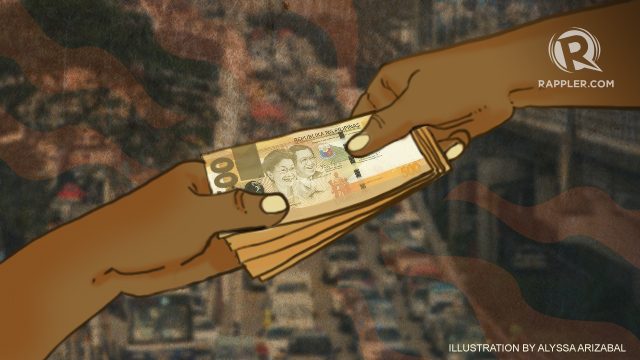SUMMARY
This is AI generated summarization, which may have errors. For context, always refer to the full article.

MANILA, Philippines – The Philippines slid further down in the annual Corruption Perceptions Index (CPI), with anti-graft watchdog Transparency International (TI) saying it is still too soon to tell how the government’s war on drugs could have an impact on corruption in the country.
The Philippines got a score of 35 for 2016, same as its score in the 2015 report. But its ranking worsened to 101st out of 176 countries, compared to 95th place out of 168 in 2015. In 2014, it was ranked 85th out of 175 countries, with a score of 38.
The report ranks nations according to their perceived level of public sector corruption.
The scores – zero means very corrupt, 100 means very clean – are based on surveys from the World Bank, the African Development Bank, the Economist Intelligence Unit, and other bodies.
For the Philippines, TI said that while President Rodrigo Duterte rose to power with a promise to stop corruption, “the impact of death squads, attacks on media, and violent intimidation to the detriment of democracy and democratic institutions is yet to be seen in 2017.”
The Duterte administration is currently deep in an all-out war against illegal drugs. As of Wednesday, January 25, more than 7,000 deaths have been linked to that war.
Critics of the government’s war on drugs say there are blatant violations of human rights.
There is also a noticeable increase, particularly online, in attacks against journalists, and a proliferation of fake news and misinformation on social media.
In Asia Pacific as a whole, TI said a majority of countries in the region “sit in the bottom half” of the CPI 2016, with 19 out of 30 countries in the region getting a score of 40 or less, out of 100.
“Poor performance can be attributed to unaccountable governments, lack of oversight, insecurity and shrinking space for civil society, pushing anti-corruption action to the margins in those countries,” it said.
Populism risks more corruption
TI also noted that the rise of populist politicians globally risks undermining the fight against corruption.
“Populism is the wrong medicine,” TI said. “In countries with populist or autocratic leaders, we often see democracies in decline and a disturbing pattern of attempts to crack down on civil society, limit press freedom, and weaken the independence of the judiciary,” said TI chair Jose Ugaz in a statement.
“Instead of tackling crony capitalism, those leaders usually install even worse forms of corrupt systems,” he added.
The Berlin-based group said in its statement that “deep-rooted” reforms were needed worldwide to tackle the inequality and systemic corruption that have proved such “fertile ground” for populists.
New Zealand and Denmark shared the number one spot with a score of 90 points, while Finland, Sweden, Switzerland, and Norway rounded out the top 5 of squeaky clean nations.
Strife-torn Somalia was the worst offender in the list for the 10th straight year, followed by South Sudan, North Korea, and Syria.
Qatar suffered the biggest fall, with a score 10 points lower than last year’s, which TI attributed to corruption claims dogging the country’s 2022 FIFA World Cup bid. – With reports from Agence France-Presse / Rappler.com
Add a comment
How does this make you feel?
There are no comments yet. Add your comment to start the conversation.